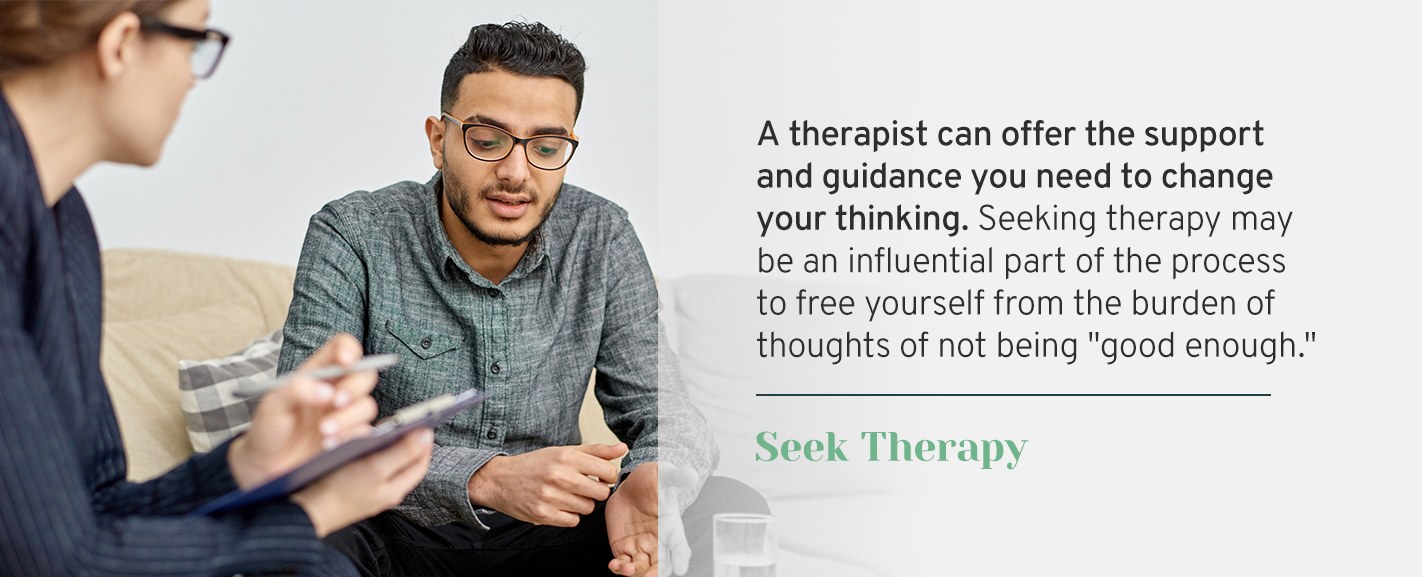When you feel inadequate or unimportant, it’s essential to stop thinking and recognize that your mind is lying to you. Low self-esteem and self-doubt can distort your perception of reality.
While everyone has these feelings occasionally, there are ways you can stop the thinking pattern to keep it from affecting your self-esteem.
Recognizing and addressing negative thought patterns can help you break free from self-defeating cycles. Therapists can help you develop strategies to cope when you’re feeling unimportant. You can use these practices to start overcoming self-doubt and managing insecurities.
Why Do We Feel Like We’re Not “Good Enough?”
Before you combat feeling like you’re not good enough, it’s helpful to understand why that emotion occurs. For some, external pressures from society create the impression of inadequacy. In fact, advertising frequently uses inadequacy as a way to sell products. Think about the ads you’ve seen for diet and beauty products that claim your body needs improvement that only their product or service can help.
In other cases, negative thought patterns take root in lessons learned from childhood. These feelings of inadequacy may require the help of a therapist to process and heal. When these thoughts become ingrained, they can make you question, “Why am I never good enough?” —even when the reality is far from it. You may even subconsciously look for signs that you don’t measure up.
However, by practicing emotional self-care and learning positive self-talk exercises, you can start to shift your perspective.
Practices to Stop Feeling Like You’re Not Good Enough
Stopping the cycle of harmful thoughts begins with standing up against the incomplete truths your emotions make you believe. Here are a few ways to begin stepping away from the brutal self-critic that tells you that you are not “good enough.”
1. Stop Comparing and Competing With Others
The phrase “good enough” implies a standard exists that you must meet. However, everyone has different traits, so no individual can meet every ideal parameter. To find peace, you can aim to stop comparing yourself to others and societal standards. Trying to live up to impossible standards only fuels self-doubt and prevents true self-confidence from developing.
For example, the ideal female body that appears in many magazines likely has heavy editing with a technique known as “airbrushing.” This method edits out flaws in the model’s appearance, such as thinning out a waist or removing blemishes from a face. This reality dictates that even perfect-looking models don’t live up to the standards enough to have untouched photos used for magazines.
In addition to not comparing yourself with others, you can end your competition to keep up with them. Focus on developing self worth based on your own values and progress. For example, you don’t have to work extra shifts to make more money because your best friend earns more than you do. Life is not a competition with others, and you may find more peace when you free yourself from competing.
2. Recall Past Achievements

If you frequently think, “why am I not enough?”, it’s time to challenge that belief by reflecting on your successes.
It’s important to recognize that emotions don’t always reflect reality. You may remind yourself solely of incidents when you didn’t meet a specific standard or failed to reach a goal. In doing so, you forget all the times when you were successful.
Combating your tendency to recall negative performances requires changing your thinking. Whenever you start to remember a time you failed, pause to recall previous successes. Focusing on when you succeeded in life can reduce the power old slip-ups have over your emotions. Over time, this practice can reshape your self-perception and strengthen your mental health and confidence.
3. Focus on the Process Rather Than Results
A results-driven mindset can lead to Impostor Syndrome — the belief that you aren’t as competent as others think.
Instead of focusing on the end goal, consider the enjoyment of the process. For example, some people only think about getting a college or graduate degree to improve their job prospects. However, those who only look at the future benefits of the degree may miss out on the experience of learning new things.
While having goals is healthy, don’t forget to enjoy the path you take to get where you want to go. We all need help and support along the way, and professional counseling services can help you navigate your feelings of inadequacy, break perfectionism habits, and speed you on the road to better mental health.
4. Speak to a Close Friend
When you’re stuck in self doubt, schedule a chat with a close friend to remind yourself how incredible you are. Few people have a perspective on your positive traits the way a friend does. They can also remind you of these traits. In fact, hearing about the good things you do and your attributes from another person can give you the mental boost you need. And you can also return the favor to your friend.
If you cannot connect with a friend immediately, you can stop and ask yourself about your internal critic. Would the things you say about yourself be the same types of things you would tell a friend? Most likely, you wouldn’t. This consideration can shed light on the harm your personal criticism has on your life. Remember, reinforcing self compassion means treating yourself with the same kindness and encouragement you offer others.
Also, consider what you would tell a friend having thoughts that they aren’t “good enough.” You would probably find ways to lift their spirits by pointing out their positive traits, and you can do the same for yourself.
5. Complete an Act of Kindness
Helping other people has a surprising effect on developing self-worth. In fact, a study from the Cleveland Clinic revealed that adolescents who performed acts of kindness toward strangers increased their self-esteem. The teen years are a turbulent time when self-worth can plummet. However, this study indicated that helping others in large and small ways can make teens feel more competent.
Apply this advice by finding ways to volunteer or help people you encounter. For instance, you may pay for the coffee order of the person behind you at the café. Or, you could volunteer at a local soup kitchen.
6. Seek Therapy
Even with help from friends and changing your mental focus, you may still struggle with feeling unimportant. If self-doubt, impostor syndrome, or managing insecurities continues to interfere with daily life, professional support can help. Therapists specialize in understanding limiting beliefs and guiding people through positive self-talk exercises that shift ingrained thought patterns.
Seeking therapy may be an influential part of the process to free yourself from the burden of thoughts of not being “good enough.”
You don’t have to feel guilty for needing help. Think of therapy as physical training for the mind. Just like a physical trainer walks you through exercises to improve your muscle tone and fitness, a therapist can guide you through practices that boost your mental health and confidence. In fact, getting help from a therapist can make overcoming negative self-talk a little easier.
Reach Out to the Taylor Counseling Group for Help Overcoming Feelings of Inadequacy
Contact the professionals at Taylor Counseling Group for support with fighting anxiety, overcoming feelings of inadequacy, and regaining your self-esteem. Our therapists specialize in developing self worth, addressing negative thought patterns, and guiding clients toward a healthier mindset.
We offer both in-person and virtual appointments. Schedule an appointment online any time of day or night using our client portal, or reach out to us by calling (214) 530-0021 to get started with therapy and counseling services.








